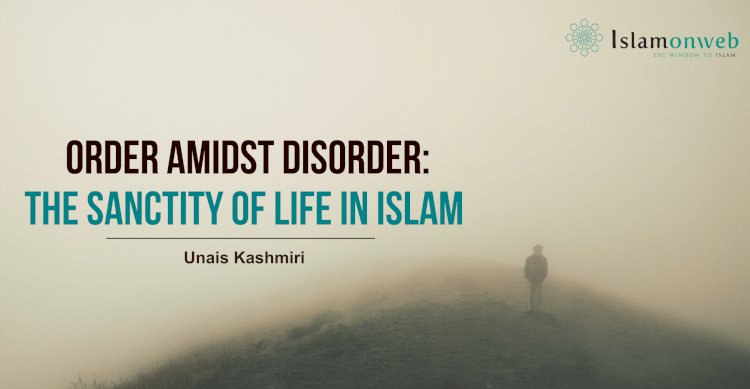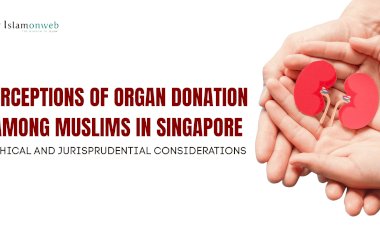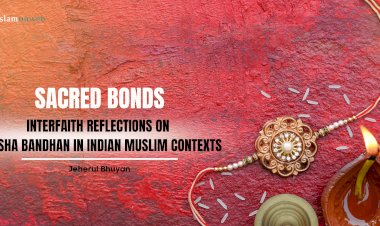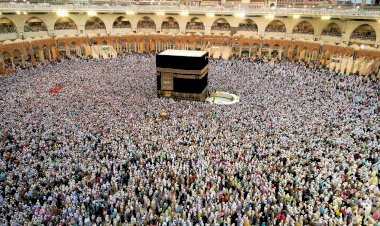Order Amidst Disorder: The Sanctity of Life in Islam
Islam espouses the sanctity of human life as a fundamental tenet, emphasizing the inherent sacredness of every individual. Central to its doctrine is the assertion that individuals are endowed with an inviolable right to life, which ought not to be unjustly infringed upon. Drawing from foundational narratives, such as the account of the first instance of homicide, the Qur'an elucidates this principle, underscoring the gravity of unlawfully terminating another's life:
"That is why We ordained for the Children of Israel that whoever takes a life—unless as a punishment for murder or mischief in the land—it will be as if they killed all of humanity; and whoever saves a life, it will be as if they saved all of humanity.” (5:32)
The divine injunction against unjustifiable homicide was articulated within the framework of God's guidance to the Israelites, as evidenced by its inclusion in the Decalogue delivered to them. Specifically, the sixth commandment, as articulated in both the Book of Exodus (Exodus 20:1-17) and the Book of Deuteronomy (Deuteronomy 5:6-22), unequivocally states "Thou shalt not kill." The Qur'an corroborates this ethical imperative, underscoring the continuity of prophetic teachings from Adam onwards, all of which cautioned against the wrongful taking of life. Within the Islamic tradition, this principle extends not only to the prohibition of unjustified killing of others but also encompasses self-harm. This sentiment is succinctly articulated in the Qur'an;
"O you who have believed, do not consume one another's wealth unjustly but only [in lawful] business by mutual consent. And do not kill yourselves [or one another]. Indeed, Allah is to you ever Merciful. And whoever does that in aggression and injustice - then We will drive him into Fire. And that, for Allah, is [always] easy.” (4:29, 30)
Prophet Muhammad (PBUH) conveyed the doctrinal stance that individuals who commit suicide are precluded from attaining Paradise, as documented in a Hadith recounted by Jundub. According to this narration, the Prophet asserted that a person who succumbed to self-inflicted harm due to injury had transcended divine decree concerning the length of their life. Consequently, Allah deemed Paradise inaccessible to such individuals, as referenced in Sahih al-Bukhari's Kitabul Jana'iz.
Furthermore, Prophet Muhammad (PBUH) elucidated the severe consequences awaiting those who unjustly seek to spill blood. Ibn Abbas relayed a Hadith wherein the Prophet delineated Allah's heightened displeasure towards three categories of individuals. These include those who perpetrate transgressions within the precincts of Masjidul-Haram, those who cling to pre-Islamic customs of ignorance (Jahiliya), and those who contemplate or engage in unjustifiable violence against others. This tradition is preserved in Sahih al-Bukhari's Kitabu Dhiyat.
The Prophet Muhammad (peace be upon him) taught that the first judgment on the Day of Judgment will concern murder. Abdullah reports a Hadith in which the Prophet (peace be upon him) stated: "The first judgment in the Hereafter will be for murder."
The Prophet Muhammad (peace be upon him) elucidated that a person residing in an Islamic society can fully experience the breadth of religion only as long as innocent blood is not shed. Ibn Umar narrates a Hadith in which the Prophet (peace be upon him) is reported to have said: "As long as the blood of the honorable (innocent) is not shed, the believer will receive the breadth of the religion." (Sahih al-Bukhari, Kitab al-Diyat)
The Qur'an makes it clear that the innocent will always be safe from the hands of the believer. Referring to the characteristics of the believers, the Qur'an said: "They are˺ those who do not invoke any other god besides Allah, nor take a ˹human˺ life—made sacred by Allah—except with ˹legal˺ right, nor commit fornication. And whoever does ˹any of˺ this will face the penalty.” (25:68)
It can be seen that the Qur'an specifically mentions murder even while enumerating the prohibited things: "Say, ˹O Prophet,˺ “Come! Let me recite to you what your Lord has forbidden to you: do not associate others with Him ˹in worship˺. ˹Do not fail to˺ honour your parents. Do not kill your children for fear of poverty. We provide for you and for them. Do not come near indecencies, openly or secretly. Do not take a ˹human˺ life—made sacred by Allah—except with ˹legal˺ right. This is what He has commanded you, so perhaps you will understand.” (6:151)
The position of Islam is that everyone has the right to be born and live after being conceived in the mother's womb. The words of the Qur'an criticizing the practices of the Jahiliyyah Arabs, who dared to kill their children for fear of starvation, today agree with the actions of those who instigate feticide due to fear of population growth. See the Qur'an enjoins: " And do not kill your children for fear of poverty. We provide for them and for you. Indeed, their killing is ever a great sin” (17; 31). It is notable that the Qur'anic instruction that 'except for just reasons' is mentioned along with 'life sanctified by Allah should not be harmed'. Islam does not teach an impractical law of non-violence that no life should be taken for any reason. Islam accepts the fact that sometimes life must be sacrificed for just reasons.
The Qur'an explicitly delineates the specific circumstances under which the taking of a life is justified. This principle is articulated in the Qur'anic verse (5:32), which states that the killing of an innocent person is tantamount to the killing of all humanity. The verse further clarifies that capital punishment is warranted for those who commit murder or spread corruption on earth. This establishes that murder and societal disorder are grave offenses that may merit the death penalty.
Moreover, the verse underscores the distinction between just and unjust killings, affirming that the execution of individuals guilty of such crimes falls within the realm of justice, whereas all other forms of killing are unjust. The authority to determine and administer punishment for these offenses rests solely with the judiciary. It is the responsibility of a judge to adjudicate cases of murder and social unrest and to impose appropriate legal consequences. Consequently, any act of killing not sanctioned by a legitimate judicial or governmental authority is deemed unlawful.
It is clear from Islamic teachings that even if it is done by mistake, murder is considered wrong and must be expiated. See what the Quran teaches: "It is not lawful for a believer to kill another except by mistake. And whoever kills a believer unintentionally must free a believing slave and pay blood-money to the victim’s family—unless they waive it charitably. But if the victim is a believer from a hostile people, then a believing slave must be freed. And if the victim is from a people bound with you in a treaty, then blood-money must be paid to the family along with freeing a believing slave. Those who are unable, let them fast two consecutive months—as a means of repentance to Allah. And Allah is All-Knowing, All-Wise." (4:92)
Islam envisions the establishment of a society devoid of violence, chaos, and social unrest. It seeks to cultivate a peaceful social order by advocating for the exemplary punishment of individuals who engage in acts of murder, disorder, rioting, and the disruption of communal harmony. However, Islamic teachings do not endorse the indiscriminate killing of individuals who hold opposing ideologies. Rather, armed conflict is only sanctioned against those who actively wage war against Muslims.
Furthermore, Islam strictly prohibits believers from taking up arms except in cases where capital punishment has been lawfully decreed by a legitimate authority or in the context of defensive warfare. Notably, even individuals who have engaged in hostilities against Islam and contributed to societal discord may be exempt from punishment if they repent and rectify their conduct before being apprehended. The overarching objective of Islamic law is not punitive but rather the establishment of a harmonious social environment in which all members of society can coexist peacefully, free from violence, disorder, and moral corruption.
About the author
Unais Kashmir is a Research Scholar specializing in Islamic Thought and Modern Trends in Islamic Studies. He holds a degree from Darul Huda Islamic University, Chemmad. He currently works as a freelance content writer for 'The Muslim Vibe', an online academic journal based in California, USA.
References;
- The Qur'an. Various verses referenced, including 5:32, 4:29-30, 4:92, 6:151, 17:31, and 25:68.
- Al-Bukhari, Muhammad ibn Ismail. 1997. Sahih al-Bukhari. Translated by Muhammad Muhsin Khan. Riyadh: Darussalam.
- Muslim ibn al-Hajjaj. 2007. Sahih Muslim. Translated by Abdul Hamid Siddiqui. Riyadh: Darussalam. (Hadith on the first judgment on the Day of Judgment being related to murder).
- Ibn Kathir, Ismail. 2003. Tafsir Ibn Kathir. Translated by Safi-ur-Rahman al-Mubarakpuri. Riyadh: Darussalam.
- Malik ibn Anas. 2013. Al-Muwatta of Imam Malik. Translated by Aisha Bewley. London: Madinah Press.
- Sabiq, Sayyid. 1991. Fiqh al-Sunnah. Translated by Muhammad Saeed Dabas and Jamal al-Din Zarabozo. Indianapolis: American Trust Publications.
- Ibn Naqib al-Misri, Ahmad. 1997. Reliance of the Traveller: A Classic Manual of Islamic Sacred Law. Edited and translated by Nuh Ha Mim Keller. Amana Publications.
- Al-Mawardi, Abu al-Hasan. 1996. Al-Ahkam al-Sultaniyyah (The Ordinances of Government). Translated by Wafaa Wahba. Reading, UK: Garnet Publishing.
Disclaimer
The views expressed in this article are the author’s own and do not necessarily mirror Islamonweb’s editorial stance.
























Leave A Comment